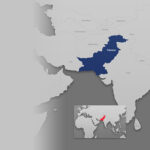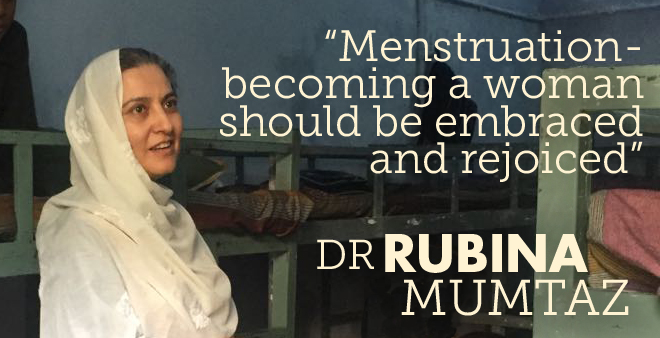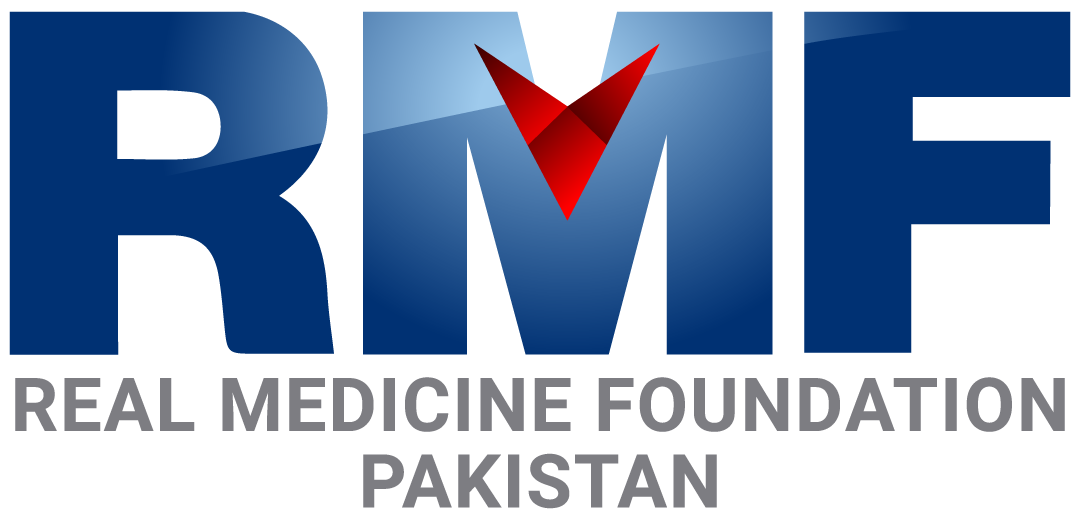- Home
- About Us
- Our Work
- Initiatives
- Disaster Relief
- Hospital and Clinic Projects & Support
- Education & School Support
- Refugee Support
- Malnutrition Eradication
- mHealth Programs
- Healthcare Education & Outreach
- Healthcare Capacity Building & Health Systems Strengthening
- HIV/AIDS Prevention & Treatment
- Mobile Clinic Outreach
- Economic Stability & Livelihood
- Community Support
- Vocational Training
- Medical Support of Individual Children
- Psychological Trauma Support
- Health Research
- News & Updates
- Get Involved

Promoting Girls’ Health and Education in Pakistan
Promoting Girls’ Health and Education in Pakistan AN INTERVIEW WITH DR. RUBINA MUMTAZ
DECEMBER 01, 2016 - PAKISTAN

For the past two months, I have had the honor of communicating with RMF Pakistan’s Country Director, Dr. Rubina Mumtaz. We have texted, emailed, and Skyped so that she could share her knowledge and expertise regarding RMF’s Menstrual Hygiene Management Project, resulting in the previous two blogs. Over the course of our communications, I have developed such respect and admiration for Dr. Mumtaz. She is intelligent, passionate about her work, and dedicated to see women and girls empowered to their fullest potential.
Finally, we get to hear straight from Dr. Mumtaz as she has generously agreed to answer some questions and provide insight into the necessity of the MHM project, RMF’s role in its success, and the future impact of improved menstrual hygiene on women’s education.
INTERVIEW Q&A
Please tell me about your role as RMF’s Country Director of Pakistan.
As the Country Director I have the overall responsibility for the strategic leadership and direction of RMF Pakistan to achieve the organizational vision, mission and objectives. I oversee programmatic and operational management of all our projects inclusive of implementation, human resource, monitoring, periodic web updates and project progress reports. I represent RMF Pakistan when creating new linkages and opportunities to forge partnership at local, national and governmental levels for new program initiatives. Often this is accompanied with grant proposal writing for funding of the same.
How did you come to be part of RMF? What drew you to the organization?
RMF Pakistan began with the devastating 2005 earthquake. I was studying at Harvard at that time and a colleague introduced me to Dr Martina Fuchs who had recently founded RMF with the Sri Lanka Tsunami. A long chat over coffee in a Boston cafe and RMF Pakistan came into being. Initially volunteering for this new setup, I became full-time as it began to grow within no time. RMF, for me, represents the ongoing opportunity to do something a little extra for the poor and vulnerable around us. Today, a decade later, I still feel like the excitement that comes with a new job because everyday something different happens which keeps me alert and on my toes. Yes, I love being able to be in this priceless role where I get to touch so many lives with a little bit of good.
What role does RMF play in the Menstrual Health Management Project?
RMF has a long history of working in the Mother and Child Health sector, so it was a natural consequence to get involved in the menstrual hygiene and management arena. Our research wing led this initiative to enter into looking at how MHM plays a crucial role in school dropout tendencies of Pakistani adolescent girls. Many factors contribute to dropout rates but the least researched was MHM. So RMF’s focus has been MHM related attitudes and behaviors of school girls in both rural and urban areas and identifying the many barriers and taboos they face in a society where the word ‘menstruation’ is spoken in hushed tones. We realize this is just a small group of women compared to a large majority of women who do not have the opportunity to go to school and they too are restricted by the taboos surrounding menstruation but we have to start somewhere.
What outcomes do you hope to see as a result of the research project?
MHM is a recent field of interest in Pakistan and RMF is very much in the forefront by being a member of the pioneer teams in the development health sector that promise to address this crucial issue that affects millions of girls daily. Our research is at the initial stage of scientifically evidencing the situation in Pakistan and will become part of the country’s baseline information on which much will be built.
Will any further research be necessary in regards to Pakistani girls’ school-going experiences?
Definitely! Like I mentioned earlier, we are currently contributing to the initial scope of literature on MHM in Pakistan and much, much more needs to be done which will involve many vast and varied project interventions associated with advanced research repeatedly until we perhaps can achieve our ultimate goal of having made a significant impact of at least reducing MHM as one of the barriers interrupting adolescent girls’ education and hence their potential to live their lives to the fullest.
How have you, personally, been impacted by the work in Pakistan (specifically with the MHM Project)?
The MHM program has been quite an eye-opener for even me, despite the fact that I belong to the same culture. Some of the taboos and restrictions we have discovered have left me dumbstruck. Yet, at the same time, where I expected greater resistance from local authorities and government in terms of permission for this type of research, I was pleasantly surprised to come across many officials (many of whom were men) who not only approved of our work but in fact felt that the women of this society need aid and knowledge in this field. This, despite the growth of Islamic dogmatism in Pakistani, was a welcome response. So yes, I feel the times have changed and are ripe for intervention.
What is your message to everyone out there who is reading this?
Menstruation – becoming a woman should be embraced and rejoiced, not met with shame and embarrassment. It is not fair that many girls in Pakistan are forced into the latter. Those of us who are empowered must do our utmost to overcome that.
Real Medicine Foundation partnered with Dr. Marni Sommer of Columbia University and gained funding from Grow N Know Inc (G&K) to launch a research study to “explore the knowledge gap of how the onset of menstruation and puberty influences the Pakistani girls’ school-going experiences, including school retention, and to develop the Pakistan girls’ puberty book…with the aim to promote young women’s health and education during pubertal transitions.” Learn more about how RMF is empowering girls in pursuit of an education.

REAL MEDICINE FOUNDATION PAKISTAN
Initiatives
- Disaster Relief
- Hospital & Clinic Projects Support
- Education & School Support
- Refugee Support
- Malnutrition Eradication
- mHealth Programs
- Healthcare Education & Outreach
- Healthcare Capacity Building & Systems
- Economic Stability & Livelihood
- Flood Victims Healthcare Outreach
- Health Research
- HIV/AIDS Prevention & Treatment
- Medical Support
- Mobile Clinics
- Psychological Support
Designed & Developed by Socialoctors
